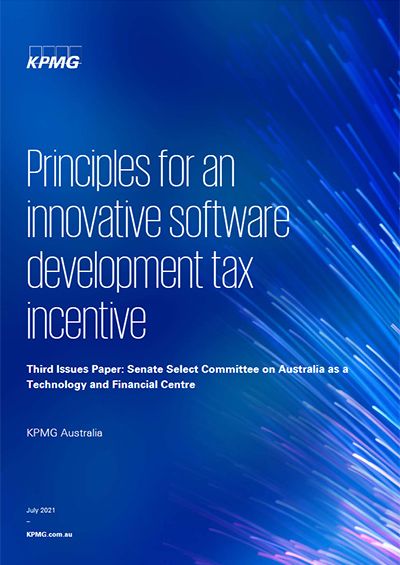KPMG provided a response to the Committee’s First Issues Paper in December 2019 and Second Issues Paper in November 2020 and welcomed the Committee’s First and Second Interim Reports. Particularly we strongly welcomed the recommendation that noted the need for further clarification around eligibility for tax incentives to ensure genuine software and technology creation by Australian startups and the recommendation that the Australian Government consider the establishment of a separate software-specific tax incentive scheme.
KPMG supports the concept of the Digital Games Tax Offset announced in the 2021-22 Federal Budget and this paper seeks to leverage this measure to look at developing a framework that may support a Software Development Tax Incentive (SDTI) for innovation in software that doesn’t currently meet the eligibility criteria set out in the Research and Development Tax Incentive (RDTI) program.
The need for new measures that encourage investment in innovation is vital as we look to recovery post COVID-19. While Australia has weathered the health crisis well, border closures mean limited access to overseas talent, increasing the cost of labour and limiting the ability for some businesses to pursue innovation agendas and invest in growth. Further, as the world opens at a faster trajectory than Australia, we will be competing with our international peers to secure footloose investment. Incentivising software-related innovation plays to Australia’s strength as a service focused economy and could offset some of the loss of income the university sector has faced through increased private investment in innovation.
The Board of Industry Innovation and Science Australia (the Board) now has the power to make binding determinations on interpretation in respect of the RDTI, which it is hoped will be used to provide greater clarity to both industry and regulators alike. However as this power was only granted from 1 January 2021, it is still untested. In addition, any determination needs to be in line with the law and this still doesn’t capture innovation that falls outside the RDTI.
A recent report for Industry Innovation and Science Australia (IISA) noted that whilst the RDTI supports R&D based innovation, there are other types of innovation which do not require R&D but have the same potential, and in some cases more, to benefit both the business developing the innovation and the broader economy.(1) In fact, the 2020 IISA report on Australian Business Investment in Innovation highlighted that close to 50 percent of innovation in Australia is non-R&D based and many of these examples are from digital innovation. Examples of this include novel hardware and software solutions which use existing technologies to develop previously untapped markets, combine and integrate platforms and technologies for innovative applications, or the creation and use of datasets that are required to test and unlock new product offerings. This problem was also highlighted in the recently published Kalifa Review of UK FinTech with a recommendation that the UK R&D tax credit program should be expanded to accommodate the cost of financial data sets.
In the context of FinTech and RegTech, there are many innovative solutions being developed that do not currently qualify for the RDTI due to the interpretation of software-based R&D activities. There are also more common examples of innovative software solutions that AusIndustry has assessed as having no levels of R&D but the product later went on to be shown to be highly innovative and led to significant ongoing investment in Australia. Having access to incentives at the early stages of software development for start-ups could accelerate investment and provide much needed capital to grow the business.
To further incentivise innovative software development that positions Australia as a technology and financial centre, the Federal Government could consider a specialised SDTI to provide support for innovative software solutions which do not qualify for existing tax incentives or grants. In addition, a collaboration premium which would reward companies for collaborating with each other and with research institutions could be developed to further incentivise innovation.(2)
This paper sets out the key principles that would form the framework of such a tax incentive.
References:
1. AlphaBeta (2020) Australian Business Investment in Innovation: levels, trends and drivers, a report for the Office of Innovation and Science Australia, January 2020.
2. As recommended by several reports; 3F report and the ISA Prosperity 2020 report.
Key contacts
Further reading






